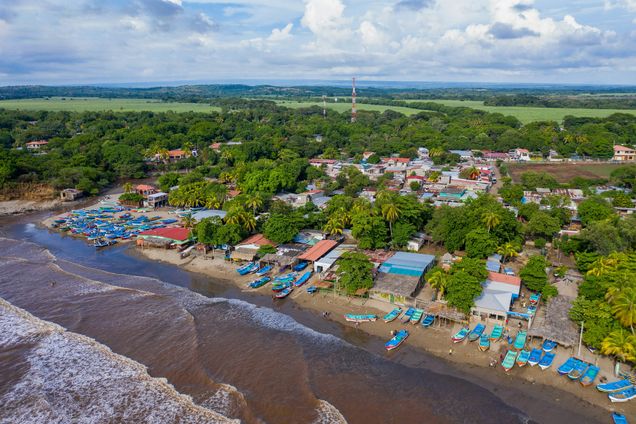
https://www.bu.edu/gdp/2025/06/26/gdp-center-round-up-4th-international-...
By Samantha Igo
As a record-breaking heat wave strains energy grids and risks public health across Europe, policymakers, activists and experts convene in Seville, Spain from June 30 to July 3 for the highly anticipated 4th International Conference on Financing for Development (FFD4).
These rather rare policy events (the last was 10 years ago in Addis Ababa, Ethiopia) provide a forum for the international community to renew a commitment to achieving the United Nations 2030 Sustainable Development Goals (SDGs) and Paris Agreement.
While it may be threadbare to say that FFD4 comes at a vital historical moment, it is no less true. Progress on the SDGs is stagnating or slipping entirely less than five years out from its eponymous deadline. Countries around the world are increasingly contending with the ruthless evidence of climate change while geopolitical instability injects the global economy with uncertainty, high interest rates and erratic trade policies. Much has also changed in the 10 years since FFD3 in Addis Ababa, with many development indicators worsening in the decade since.
It is no longer possible to ignore the brittleness of the international financial architecture (IFA) in the face of global challenges, and both the timing and rarity of this FFD conference establishes it as an inflection point toward either progress or acquiescing to an untenable status quo.
Ahead of FFD4, the Boston University Global Development Policy Center (GDP Center) has published a slew of research on IFA reform, the emerging debt crisis in developing countries, China’s overseas lending, resource mobilization and more to inform policy dialogues. Brief summaries of key issue areas and accompanying resources are provided below.
FFD4 Resources:
- Blog: FAQs: What Can be Expected from the 4th International Conference on Financing for Development?
- Blog: 10 Ways Financing for Development has Changed in 10 years
Reimagining a fit-for-purpose international financial system

The international financial system that emerged in the wake of World War II and during the slow disintegration of colonialism was not designed for a modern world contending with climate change. Today, leaders are futilely relying on the institutions of the past to solve the problems of the present and future.
To remedy this misalignment, the international financial system should be made bigger, better and more inclusive. Experts estimate that emerging market and developing economies (EMDEs), excluding China, will need to mobilize $3 trillion annually by 2030 to meet shared climate and development goals. As the World Bank chief economist admits that the “billions to trillions” strategy of leveraging public money to catalyze private investment has “proved to be a fantasy,” development finance institutions (DFIs) must play a central role in closing this finance gap. Domestic efforts to secure resources need to be reinforced by a retooling of the global tax architecture.
However, bigger does not alone imply better. A big investment push must be accompanied by appropriate lending and governance practices. For example, debt sustainability analyses (DSAs) at the International Monetary Fund (IMF) and World Bank should account for both climate investments and shocks, and these institutions should move away from austerity-backed programs toward investment-led structural transformation. Policy advice needs to be context-specific and recognize that common prescriptions like carbon taxes alone will not offset the financial strain many countries will experience during a low-carbon transition.
Finally, voting power at neither the IMF nor the World Bank accurately reflects the economic weight of EMDEs, instead awarding outsized influence to advanced economies like the United States. Not only does this leave developing countries with little sway over institutional governance, but it also risks the very legitimacy of the Bretton Woods institutions.
The bottom line: An unreformed IFA cannot help deliver on shared climate and development goals and will instead lock countries into catastrophic climate and development trajectories. The system must be made bigger to deliver the scale of lending required, better with enhanced lending and governance practices, and more inclusive with realigned voice and representation for Global South countries.
Resources on IFA reform:
- Policy brief: Investing in Climate and Development: The Evolving Role of the International Financial and Tax Architectures
- Policy brief: Back to the Future: How the Pre-OECD Global Tax Landscape Offers Lessons for Today
- Working paper: The International Financial Architecture and Sustainable Prosperity
A debt and development crisis stymies developing countries

Developing countries face historic levels of external debt, with 3.3 billion people living in countries spending more on servicing their debt than on health and education. At least 30 African countries alone spend more on debt service than public health.
Climate-vulnerable countries in particular are left to contend with a relentless debt and climate cycle: without the fiscal space to invest in climate and development measures, climate-vulnerable development countries are left worse off in the aftermath of a climate event. A bloc of climate-vulnerable countries called the Vulnerable Group of 20 (V20) found that these countries would have been 20 percent wealthier today had it not been for the losses and damages incurred from climate change.
Recognizing the severity of the moment, Pope Francis convened a Jubilee Commission, mirroring the Jubilee year in 2000 and the Heavily Indebted Poor Countries Initiative that ultimately relieved 37 countries of more than $100 billion in debt. A new report from the Jubilee Commission calls for a comprehensive rethink of the international debt architecture and provides a blueprint for enabling developing countries to achieve sustainable debt levels while also investing in critical social spending.
The bottom line: Without enhanced DSAs and reformed debt restructuring mechanisms, such as the Group of 20 (G20) Common Framework, the SDGs and Paris Agreement will be unattainable, and the social costs for developing countries will be dire. This is a pivotal policy moment to free many debt-distressed developing countries of the vicious debt-climate cycle and instead invest in structural change.
Resources on debt:
- Report: The Jubilee Report: A Blueprint for Tackling the Debt and Development Crises and Creating the Financial Foundations for a Sustainable People-Centered Global Economy
- Report: Healthy Debt on a Healthy Planet: Towards a Virtuous Circle of Sovereign Debt, Nature and Climate Resilience
- Journal article: Debt Sustainability Analysis as if Development Really Mattered
- Working paper: Diverting Development: The G20 and External Debt Service Burden in Africa
- Blog: The Cost of Inaction: Explaining Africa’s Debt Distress in 10 Charts — and Five Fixes for the G20
China’s overseas finance shifts toward green energy and away from individual project finance

For over 15 years, China has been a vital source of development finance for low- and middle-income countries (LMICs) around the world, committing nearly a half-trillion dollars in public and publicly guaranteed (PPG) finance since 2008.
New research from two databases maintained by the GDP Center reveals two key trends for China’s overseas finance. First, the composition of Chinese overseas energy finance for both foreign direct investment (FDI) and DFIs has shifted to green energy, and there has been no new investment in coal-fired power plants since Chinese leader Xi Jinping’s pledge to stop coal funding in 2021. However, while China has not financed coal since its no new coal policy, previously approved projects already in the pipeline are being completed and still coming online. This means that China’s overseas energy portfolio will remain heavily carbon intensive for some time, despite this nascent shift toward green energy.
Second, for the first time from 2020-2024, China’s overseas development finance is shifting away from direct project finance and toward support of development finance intermediaries, like national and regional development banks. This is a notable shift, as direct support for energy and infrastructure projects comprised the lion’s share of its overseas development finance prior to 2020, and could indicate a maturation of the Belt and Road Initiative (BRI).
The bottom line: The data reflect an interregnum for China’s overseas finance. As China moves away from direct project lending and its overseas energy portfolio no longer matches its previous scale, developing a stronger project pipeline that better addresses environmental and social risks while promoting renewable energy will become increasingly important.
Resources on China’s economic activity:
- Database: China’s Overseas Development Finance Database
- Database: China’s Global Power Database
- Policy brief: Peer-to-Peer Lending: China’s Overseas Development Finance Pivots to National and Regional Development Banks
- Working paper: Empowering Africa: The Impact of China’s Power Finance on Energy Poverty
- Working paper: Direct Impacts and Spatial Spillovers: The Impact of Chinese Infrastructure Projects on Economic Activities in sub-Saharan Africa
The Boston University Global Development Policy Center is a policy-oriented research center working to advance financial stability, human well-being and environmental sustainability across the globe through rigorous interdisciplinary research, policy engagement and strategic communications.
A University-wide research center in partnership with the Office of Research and the Frederick S. Pardee School of Global Studies at Boston University, the GDP Center is built upon achieving five pillars: fostering a global development policy community at Boston University, advancing scholarly ‘research that matters’ on global development policy, engaging in global policy dialogue and strategic communications, providing a ‘vibrant academic experience’ through student research and experiential learning, and solidifying the legacy of the GDP Center by developing a global support base.
In 2017, the GDP Center was inaugurated by former UN Secretary-General Ban Ki-moon, who led the establishment of the Sustainable Development Goals and presided over the Paris Climate Agreement. Ban Ki-moon charged the GDP Center to not only be a university-based think tank, but also an action tank. Taking that directive seriously, the GDP Center advances policy-oriented interdisciplinary academic research, engages in policy dialogue and conducts strategic communications to advance its mission.
The GDP Center hosts three research initiatives:
The Global China Initiative (GCI) advances policy-oriented research on China’s overseas economic activity and engagement with international institutions in order to enable financial stability, human well-being and environmental sustainability.
The Global Economic Governance Initiative (GEGI) seeks to advance policy-oriented research to align global economic governance with development and climate ambitions and deliver green and inclusive prosperity.
The Human Capital Initiative (HCI) works to advance interdisciplinary research on the role of human capital in human development to inform policy solutions to global challenges including poverty, women’s empowerment and sustainable economic growth through investments in education and health.









